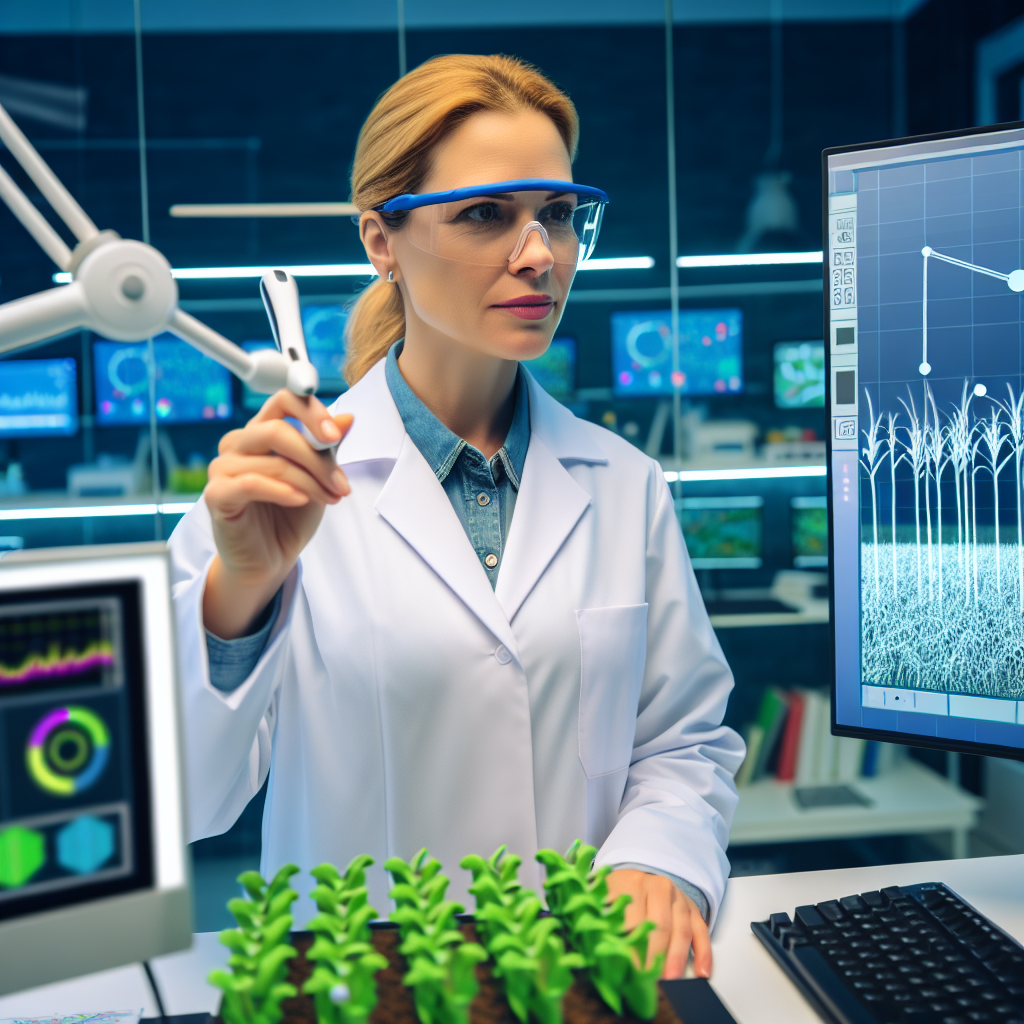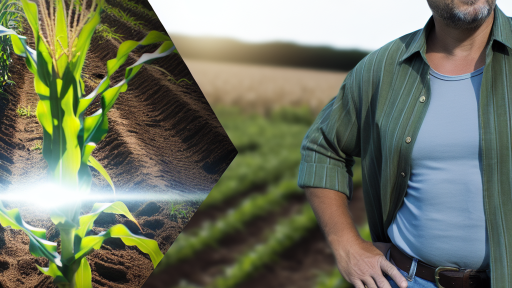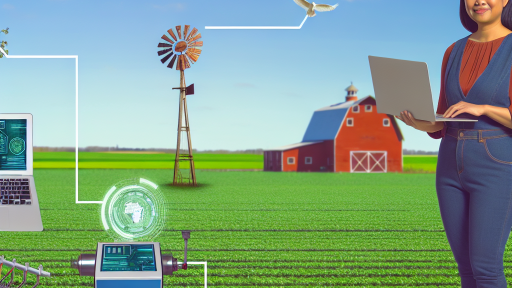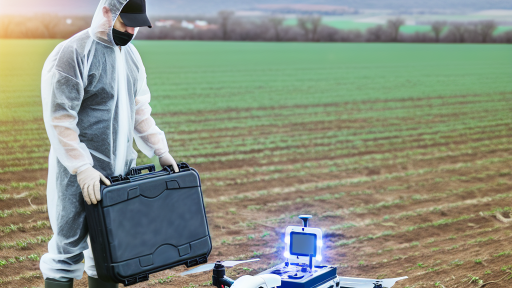Introduction to Biotechnology in Agriculture
Biotechnology is transforming agriculture in remarkable ways.
It involves using living organisms to improve crop production.
This technology enhances food security and sustainability.
Consequently, it supports farmers in coping with environmental challenges.
Understanding the Basics of Biotechnology
Biotechnology encompasses various techniques to manipulate biological systems.
For instance, it includes genetic engineering and molecular breeding.
These methods allow scientists to develop crops with desirable traits.
Moreover, they significantly reduce the time required for breeding new varieties.
Benefits of Biotechnology in Agriculture
This technology brings numerous benefits to the agricultural sector.
- Increased crop yields enhance food production.
- Improved resistance to pests and diseases reduces losses.
- Sustainable practices lower the need for chemical fertilizers.
Furthermore, it promotes agricultural resilience against climate change.
Innovative Applications in Biotechnology
Biotechnology offers various innovative applications in agriculture.
One prominent example is genetically modified organisms (GMOs).
These crops are engineered to withstand adverse conditions.
For example, drought-resistant corn varieties show significant promise.
Additionally, biopesticides derived from natural organisms offer eco-friendly solutions.
Transform Your Agribusiness
Unlock your farm's potential with expert advice tailored to your needs. Get actionable steps that drive real results.
Get StartedFuture Directions of Biotechnology in Agriculture
The future of biotechnology in agriculture appears promising.
Advancements in synthetic biology can lead to groundbreaking innovations.
These innovations may include lab-grown crops designed for specific climates.
Moreover, precision agriculture utilizes biotechnological advances for efficiency.
As a result, farmers can optimize their resources, enhancing productivity.
Role of Genetically Modified Organisms (GMOs) in Smart Agriculture
Enhancing Crop Yields
GMOs significantly boost crop productivity.
They are engineered to resist pests and diseases.
This resistance leads to less crop loss.
Farmers can produce more food sustainably.
Reducing Chemical Inputs
Genetically modified crops often require fewer pesticides.
This reduction lowers chemical runoff into the environment.
Farmers save costs while promoting ecosystem health.
Improving Nutritional Content
GMOs can also enhance the nutritional value of crops.
For example, biofortified varieties provide essential vitamins.
This contributes to better health in vulnerable populations.
Adapting to Climate Change
GMOs offer adaptation solutions for changing climates.
They can be engineered for drought tolerance.
This trait helps maintain yields during dry seasons.
Additionally, some varieties withstand extreme temperatures.
Facilitating Sustainable Farming Practices
GMOs integrate well with precision agriculture technologies.
This synergy allows for smarter resource management.
Farmers can apply water and fertilizer more efficiently.
As a result, environmental impacts decrease significantly.
Challenges and Ethical Considerations
Despite their benefits, GMOs face scrutiny.
Showcase Your Farming Business
Publish your professional farming services profile on our blog for a one-time fee of $200 and reach a dedicated audience of farmers and agribusiness owners.
Publish Your ProfilePublic opinion varies regarding safety and ethics.
Transparency in labeling and research is essential.
Ongoing education helps address concerns effectively.
Advancements in Precision Farming Technologies
Integrating Data Analytics
Data analytics plays a crucial role in precision agriculture.
Farmers can analyze soil, weather, and crop data instantly.
This integration leads to informed decision-making and resource optimization.
As a result, productivity increases while costs decrease.
Utilizing Drones and UAVs
Drones are transforming the agricultural landscape.
They provide real-time aerial imagery for better monitoring.
This technology enhances field mapping and crop health assessments.
Farmers can identify issues before they escalate.
Implementing IoT Devices
The Internet of Things (IoT) facilitates smart farming.
Sensors monitor climate, soil moisture, and nutrient levels continuously.
This data assists in automating irrigation and fertilization.
Ultimately, it maximizes yields and minimizes waste.
Adopting Genomic Technologies
Genomics is revolutionizing crop breeding techniques.
Farmers can create varieties that withstand stressors better.
This advancement leads to improved resilience against pests and diseases.
Moreover, it contributes to sustainable farming practices.
Enhancing Robotics in Agriculture
Robotic systems streamline farm operations significantly.
These machines perform tasks like planting and harvesting efficiently.
Consequently, labor costs decrease while productivity rises.
Automation also reduces human error in farming practices.
Utilizing Vertical Farming Techniques
Vertical farming represents a new model for food production.
This practice uses less land while maximizing output.
Additionally, it allows for year-round cultivation regardless of climate.
Such innovation supports urban agriculture and food security.
You Might Also Like: Overcoming Challenges in Controlled Environment Agriculture for Farmers
Use of CRISPR and Gene Editing Techniques
Introduction to CRISPR Technology
CRISPR technology revolutionizes biotechnology in agriculture.
This method allows precise gene editing in crops.
Significantly, it enhances productivity and resilience.
Benefits of Gene Editing in Agriculture
Gene editing improves crop yield and quality.
Additionally, it fosters resistance to pests and diseases.
Moreover, CRISPR offers reduced reliance on chemical pesticides.
Examples of CRISPR Applications
Several companies utilize CRISPR in their research.
For instance, BioPlant Genetics enhances drought resistance.
Furthermore, AgriGenome focuses on increasing nutritional content.
These advancements demonstrate practical benefits for farmers.
Challenges and Considerations
Despite its potential, CRISPR faces regulatory hurdles.
Some countries still debate gene editing policies.
Showcase Your Farming Business
Publish your professional farming services profile on our blog for a one-time fee of $200 and reach a dedicated audience of farmers and agribusiness owners.
Publish Your ProfilePublic perception also plays a crucial role in adoption.
Future Directions in Gene Editing
The future of gene editing looks promising.
Research continues to expand into new crop varieties.
Innovations in this field will shape sustainable farming practices.
Delve into the Subject: How Digital Finance Enhances Agricultural Operations Efficiency
Impact of Biopesticides and Biocontrol Agents
Introduction to Biopesticides
Biopesticides offer a sustainable alternative to chemical pesticides.
They originate from natural materials like plants, animals, and minerals.
Moreover, they pose fewer risks to human health and the environment.
Advantages of Using Biopesticides
Biopesticides enhance crop protection in diverse agricultural settings.
They often target specific pests, reducing collateral damage to beneficial insects.
Additionally, their use promotes healthier soil microbiomes.
Role of Biocontrol Agents
Biocontrol Agents help manage pest populations naturally.
These agents include predators, parasites, and pathogens that attack pests.
They create a balanced ecosystem, fostering natural pest regulation.
Real-World Applications
Several companies successfully implement biopesticides in agriculture.
For instance, EcoSmart Technologies leverages plant extracts for pest control.
Similarly, BioWorks specializes in microbial solutions that enhance plant health.
Challenges and Limitations
Despite their benefits, biopesticides face certain challenges.
Farmers may have concerns about their effectiveness compared to synthetic options.
Additionally, regulatory hurdles can slow down their adoption.
Future Prospects
The future of biopesticides looks promising with ongoing research.
Advancements in biotechnology may lead to more effective formulations.
Ultimately, biopesticides and biocontrol agents could revolutionize smart agriculture.
Learn More: AI Solutions For Pest And Disease Management

Integration of IoT and Biotechnology for Crop Monitoring
Enhancing Real-Time Data Collection
The combination of IoT and biotechnology significantly improves data collection in agriculture.
Farmers now utilize sensors to monitor soil moisture and nutrient levels continuously.
This real-time data allows them to make informed decisions quickly.
Furthermore, sensors can detect pest infestations early in their development.
This timely information empowers farmers to take action before infestations spread.
Utilizing Drones for Crop Surveillance
Drones equipped with advanced cameras provide aerial views of crop health.
These images help farmers identify issues that are not visible from the ground.
Drones can assess crop density and overall growth patterns effectively.
Moreover, they can deliver targeted applications of nutrients or pesticides.
This targeted approach reduces waste and environmental impact.
Implementing Predictive Analytics
Advanced algorithms analyze data collected from IoT devices and drones.
Farmers can predict crop yields and optimize planting schedules using these analytics.
Additionally, they can forecast weather impacts on crop growth.
This knowledge enables farmers to prepare adequately and mitigate risks.
As a result, they can increase crop productivity and profitability.
Integrating Genetic Insights
Biotechnology enhances crop resilience through genetic modifications.
Showcase Your Farming Business
Publish your professional farming services profile on our blog for a one-time fee of $200 and reach a dedicated audience of farmers and agribusiness owners.
Publish Your ProfileScientists develop crop varieties resistant to pests and diseases.
This integration works synergistically with IoT systems for monitoring crop health.
Farmers can focus on specific crops that are genetically improved and well-suited for their environments.
This adaptation leads to improved sustainability in farming practices.
Fostering Sustainable Practices
Combining IoT and biotechnology promotes sustainable agriculture.
Farmers reduce input costs through efficient resource use.
Moreover, they minimize environmental impact while maximizing yields.
This holistic approach contributes to a healthier ecosystem.
Consequently, smart agriculture benefits both farmers and consumers.
Learn More: The Future Of Precision Farming Through Biotechnology
Sustainable Practices through Biotechnology Innovations
Enhancing Crop Efficiency
Biotechnology significantly enhances crop efficiency.
It allows scientists to develop crops that require less water.
These advancements also reduce the need for pesticides and fertilizers.
Consequently, farmers can achieve higher yields sustainably.
Improving Soil Health
Biotechnology contributes to improved soil health.
Innovative techniques promote beneficial microbial activity in the soil.
These techniques help restore nutrient balance effectively.
As a result, soil becomes more resilient to erosion.
Developing Drought-Resistant Varieties
The demand for drought-resistant crops is increasing rapidly.
Biotech advancements create varieties that thrive in arid conditions.
Farmers can cultivate these crops despite changing climate conditions.
Moreover, this leads to more stable food supplies.
Promoting Integrated Pest Management
Biotechnology plays a vital role in integrated pest management.
It provides tools for developing pest-resistant crops.
These crops significantly reduce pest damage and losses.
Farmers find it easier to manage pest populations sustainably.
Encouraging Sustainable Practices
Biotechnology encourages sustainable farming practices worldwide.
It helps reduce the carbon footprint of agricultural activities.
Farmers can adopt practices that focus on conservation and sustainability.
Such practices ensure long-term agricultural viability.
Empowering Farmers Through Education
Education empowers farmers to use biotechnology effectively.
Workshops and training sessions increase knowledge and skills.
Farmers learn best practices for implementing biotech innovations.
Consequently, they see tangible benefits in their operations.
Fostering Collaboration and Research
Collaboration among researchers and farmers is crucial.
Partnerships drive innovation and the sharing of best practices.
Research initiatives focus on developing relevant biotechnological solutions.
Collectively, they build a more sustainable agricultural future.
Future Trends and Challenges in Agricultural Biotechnology
Emerging Technologies Impacting Agriculture
New technologies lead the way in agricultural biotechnology.
Genetic editing tools, like CRISPR, allow for precise modifications.
Showcase Your Farming Business
Publish your professional farming services profile on our blog for a one-time fee of $200 and reach a dedicated audience of farmers and agribusiness owners.
Publish Your ProfileFurthermore, these innovations enhance crop resistance and yield.
Biopesticides and biofertilizers promote environmentally friendly farming.
Therefore, adopting these technologies can significantly reduce chemical usage.
Integration of Data Analytics and AI
Data analytics plays a crucial role in smart agriculture.
Farmers leverage data to make informed decisions about planting and harvesting.
Artificial intelligence enhances predictive modeling for crop growth.
Additionally, it streamlines supply chain management and forecasting.
Transitioning to data-driven strategies improves efficiency and productivity.
Challenges of Regulatory Compliance
Regulatory hurdles remain a significant challenge for biotechnology adoption.
Stringent regulations can slow down the approval of new technologies.
As a result, companies must navigate complex regulatory landscapes.
Collaboration between industry and regulators is crucial for progress.
Advocating for science-based regulations can facilitate innovation.
Public Perception and Acceptance
Public perception significantly influences biotechnology’s future in agriculture.
Misunderstandings about genetically modified organisms drive fear and resistance.
Educational initiatives are essential to inform consumers about benefits.
Transparency in practices can help build trust with consumers.
Moreover, addressing ethical concerns fosters a more inclusive dialogue.
Global Collaboration for Sustainable Practices
Global challenges require international cooperation in biotechnology efforts.
Sharing knowledge and resources can accelerate innovation.
Public-private partnerships play a key role in developing sustainable solutions.
Furthermore, collaboration can help address food security issues worldwide.
Ultimately, working together is vital to meet future agricultural demands.
Additional Resources
Innovations in Seed and Farming Technologies Drive Productivity …




